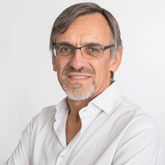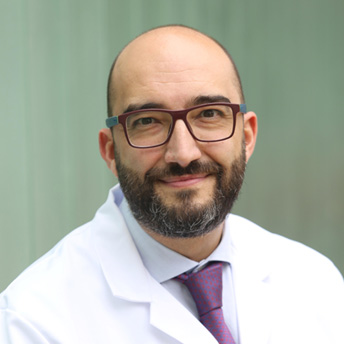
Expert Interview 4: Frequently Asked Questions (FAQs) for Second-Line (2L) and Salvage Treatments in Urothelial Cancer
Release date: 11-12-2023
Expiration date: 11-12-2024
There is a steadily widening range of second-line (2L) and subsequent treatment options for patients with advanced UC including chemotherapy, immune checkpoint inhibitors (ICIs) and novel therapies. In recent years, ICIs have predominantly replaced chemotherapy as the preferred 2L treatment. Furthermore, antibody-drug conjugates (ADC) and targeted agents have become available.
The selection of 2L and salvage treatments for advanced UC depends on many factors, including the initial treatment strategy used in the first-line setting. Molecular classifications appear to be promising in disease prognostication and prediction for UC.
Let's watch the recorded video on 'Frequently Asked Questions (FAQs) for 2L and Salvage Treatments' to gain comprehensive insights from leading experts – Dr. Francisco X. Real from National Cancer Research Center of Spain and Dr. Enrique Grande from MD Anderson Cancer Center Madrid.
This program is available with subtitles in the following languages:

Faculty

Francisco X. Real, MD, PhD
National Cancer Research Center
Madrid, Spain
Francisco X. Real (Paco) has been Professor of Cell Biology at Universitat Pompeu Fabra, Barcelona, Spain, since 2004, and he has also worked at Spanish National Cancer Research Center (CNIO), Madrid, Spain, since 2007. He obtained his MD from the Universitat Autònoma de Barcelona in 1980 and his PhD in 1986. He trained in Medical Oncology at Memorial Hospital in New York where he was a Staff Physician from 1986 to 1988. He carried out his doctoral and postdoctoral work in the laboratory of Lloyd J. Old at Memorial Sloan-Kettering Cancer Center. His work focused on the development of immunological strategies for the treatment of melanoma and epithelial cancers. In 1988, he joined the Institut Municipal d'Investigació Mèdica, Barcelona, where he focused on the cell and molecular biology of epithelial cancers. He was also involved in setting up the Biomedical Sciences studies at Universitat Pompeu Fabra.
At CNIO, Professor Real's group has made significant contributions to the molecular mechanisms involved in pancreatic cancer and in pancreatitis and the molecular pathology and epidemiology of bladder and pancreas cancer. His work combines the use of patient samples, cultured cells, and genetically modified mice, giving a similar relevance to all of them. One important aim of the group’s work is to bring the fundamental knowledge generated in the laboratory to an improved understanding of disease and to develop improved strategies for prevention, early diagnosis, and treatment of pancreatic and bladder cancer.
Professor Real has published more than 300 original papers and his work has been published in Nature, Nature Genetics, Nature Cell Biology, Nature Communications, Nature Reviews Cancer, Gut, Gastroenterology, PNAS, JNCI, J Clin Invest, N Engl J Med, and Lancet, among others. He has received more than 29,000 citations (Google Scholar); his H index is 96. He is a member of the Scientific Advisory Board of several institutions including the Discovery Research Committee of Cancer Research UK (London), Centre de Recherche des Cordeliers (Paris), CARPEM (Paris), Pancreatic Cancer Research UK (London), and Fonds National de la Recherche Scientifique (Brussels). He is an Associate Editor of Gut and Bladder Cancer. In 2015, he was President of the European Pancreatic Club.

Enrique Grande, MD, MSc, PhD | Chair
MD Anderson Cancer Center Madrid
Madrid, Spain
Enrique Grande is the current Director of the Medical Oncology Program at the MD Anderson Cancer Center Madrid. Dr. Grande is focused on the research into genitourinary tumors and is actively involved in collaborating on the development of the Translational Research and Early Drug Development Unit. Dr. Grande was awarded his PhD for a pharmacokinetic and pharmacodynamic study of tyrosine kinase inhibitors in liver metabolism, and he holds a master’s degree in the molecular biology of cancer from the Spanish National Cancer Research Center (CNIO). A published author of more than 200 manuscripts in peer-reviewed journals, Dr. Grande is also the founder of the Spanish group for research on orphan and uncommon tumors (GETHI). Dr. Grande is the editor of several international journals and has been the editor of a range of books related to oncology. Dr. Grande has participated in the most recent trials in the field of genitourinary and neuroendocrine tumors that led to the approval of the new drugs we now have available.
This activity is design designed for medical oncologists and urologists involved or interested in the management of urothelial cancer.
The aim of this educational activity is for participants to:
- Identify how to sequence available treatments for second-line or later-line of unresectable locally advanced or metastatic urothelial cancer
- Improve understanding of the novel drugs in development and consider the impact to optimize the new treatment strategies in the future
- Develop a greater awareness of the different molecular and pathologic subtypes of urothelial cancers and the role of prognostic and predictive biomarkers in patient management
This educational activity is provided by ACE Oncology.
This educational activity is supported by an independent grant from the Healthcare business of Merck KGaA, Darmstadt, Germany.
This activity provides content that is evidence-based, balanced, and free of commercial bias, with a primary objective to improve competence and performance of learners in order to improve patient care.
The faculty reported the following financial relationships or relationships to products or devices they or their spouses/life partners have with commercial interest related to the content of this activity:
Enrique Grande has received honoraria for speaker engagements, advisory roles or funding for continuing medical education from Advanced Accelerator Applications, AMGEN, Angelini, Astellas, Astra Zeneca, Bayer, Blueprint, Bristol Myers Squibb, Caris Life Sciences, Celgene, Clovis-Oncology, Dr. Reddy’s, Eisai, Esteve, Eusa Pharma, Genetracer, GSK, Guardant Health, HRAPharma, IPSEN, ITM-Radiopharma, Janssen, Lexicon, Lilly, Merck KGaA, MSD, Nanostring Technologies, Natera, Novartis, ONCODNA (Biosequence), Palex, Pharmamar, Pierre Fabre, Pfizer, Raffo, Roche, Sanofi-Genzyme, Servier, Taiho, Tecnofarma, Thermo Fisher Scientific and Zodiac. He has also received grants for clinical research from Astellas, Astra Zeneca, IPSEN, Lexicon, Merck KGaA, MTEM/Threshold/Tersera, Nanostring Technologies, Pfizer and Roche. He has agreed to disclose any unlabeled/unapproved uses of drugs or products referenced in his presentation.
Francisco X. Real has received grants for research from VCN Biosciences and Janssen. He has agreed to disclose any unlabeled/unapproved uses of drugs or products referenced in his presentation.
The employees of ACE Oncology have disclosed no relevant financial relationships.
ACE Oncology requires instructors, planners, managers, and other individuals who are in a position to control the content of this activity to disclose any real or apparent conflict of interest (COI) they may have as related to the content of this activity. All identified COIs are thoroughly vetted and resolved according to ACE Oncology’s policy. ACE Oncology is committed to providing its learners with high-quality activities and related materials that promote improvements or quality in healthcare and not a specific proprietary business interest of a commercial entity.
